Toda a informação sobre a famosa Creatina
Neste guia vais ficar a saber não só o que é a Creatina, mas também o que é que faz, como o faz, quais os diferentes tipos (e os melhores), como tomar e muito mais.
Respondemos ainda a algumas dúvidas comuns sobre este suplemento e no final tens ainda a zona de comentários para o caso de teres alguma dúvida específica.
So let's get started.
Note. Se quiseres simplesmente saber quais são os melhores suplementos de Creatina do mercado, vê o artigo The best Creatine supplements (and the worst too).
O que é a Creatina?
Quando ouves este nome, provavelmente associas imediatamente ao seu suplemento, no entanto, ela está presente nas carnes e peixes que consomes, e o teu próprio corpo é capaz de a produzir através de alguns aminoácidos.
Como já deves ter percebido, não é nenhum veneno produzido em laboratório, mas sim um composto natural que ocorre naturalmente no corpo humano.
É um composto orgânico não essencial – porque o corpo é capaz de o produzir – com um papel muito importante no fornecimento de energia.
Começou a ganhar muita popularidade nos anos 90, quando começaram a sair cada vez mais estudos a comprovar a sua eficácia, e cada vez mais atletas começaram a utilizá-la.
What does Creatine do and what is it for?
A creatina depois de ingerida é armazenada nos músculos como creatina(Cr) e fosfocreatina(CP).
E o que é a fosfocreatina?
A fosfocreatina é a creatina com um grupo fosfato, e esta sim, pode fornecer energia, participando no ciclo ADP-ATP.
Primeiro que tudo, o ATP é a nossa fonte de energia imediata, e depois de utilizado, transforma-se em ADP.
O que é que a fosfocreatina vai fazer?
A fosfocreatina vai doar um grupo de fosfato ao ADP, e assim, voltamos a ter ATP rapidamente para fazermos mais repetições.
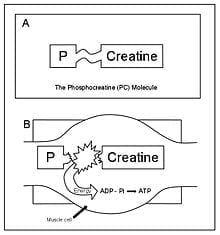
Existem três sistemas energéticos para fornecer ATP, mas aquele que utilizamos no treino de musculação é o ATP-CP, que é a forma mais rápida de obtermos ATP.
O ATP-CP depende das reservas de creatina fosfato, que são muito reduzidas, dai a curta duração deste sistema energético.
By using a Cr supplement, you will increase your creatine phosphate reserves, and thus, you will be able to produce ATP for longer.
É este o grande benefício da suplementação.
Mais creatina = Mais ATP = Mais repetições = Mais resultados
Outro benefício, é o aumento de água dentro dos músculos.
Isto vai não só dar um maior volume aos músculos, mas vai também ajudar no crescimento muscular. (ref)
Então mas…funciona mesmo?
Vamos lá ver o que os estudos nos dizem.
Cinco dias de suplementação com Cr aumentaram o peso corporal e massa corporal livre de gordura em homens que fazem treino de resistência e que foram classificados como respondedores.
A força máxima, e força total durante um teste isométrico de supino repetição máxima também eram significativamente maiores nos respondedores em comparação com o grupo placebo
http://www.ncbi.nlm.nih.gov/pubmed/12131259.
A suplementação de Cr durante o treino de força de braço levam a um maior aumento da força muscular dos flexores do braço, área muscular do braço, e de massa livre de gordura do que o treino de força sozinho.
http://www.ncbi.nlm.nih.gov/pubmed/10731009
Dos 22 estudos analisados, o aumento médio da força muscular (1, 3, 10 ou repetição máxima [RM]) após a suplementação de Cr, mais treino de resistência foi de 8% maior do que o aumento médio da força muscular após a ingestão de placebo durante o treino de resistência (20 vs 12%).
Da mesma forma, o aumento médio no desempenho de levantamento de peso (repetições máximas a uma determinada percentagem de força máxima) após a suplementação de Cr, mais treino de resistência foi de 14% maior do que o aumento médio na performance de levantamento de peso após a ingestão de placebo durante o treino de resistência (26 vs. 12%).
The increase in bench press 1RM ranged from 3 to 45%, and the improvement in bench press weightlifting performance ranged from 16 to 43%.
http://www.ncbi.nlm.nih.gov/pubmed/14636102
Well, it seems so.
Different types of creatine
Creatine Monohydrate
Esta é a forma mais comum de creatina, e também aquela que serve como base de comparação a nível de qualidade e eficácia.
A maior parte dos estudos feitos em relação aos benefícios deste suplemento utilizam a forma de monohidrato.
A CM é composta por 88% creatina (12% é monohidrato), e pode também ser micronizada, reduzindo assim o tamanho das partículas, e aumentando a solubilidade em água.
Existe ainda a forma Creapure, que embora seja apenas CM, é uma forma patenteada e com rigorosos padrões de qualidade, e é muitas vezes a escolhida nos estudos científicos.
Creatine Ethyl Ester
A CEE foi uma tentativa de desenvolver uma alternativa superior à forma de monohidrato, e é provavelmente a maior desilusão de todas as alternativas.
Este tipo não só não é superior à CM, como os diferentes estudos que acabaram por ser divulgados em relação a esta fórmula, mostram que chega a ser muito inferior. (ref)
A CEE é facilmente convertida em creatinina, e não em creatina, sendo portanto uma fórmula a evitar.(ref)
Creatina Líquida
Esta é mais uma forma de suplementação de creatina, e que felizmente, não é muito popular.
A versão líquida sofre do mesmo mal da CEE, ou seja, é facilmente convertida em creatinina, mas de forma diferente.
A creatina quando em estado líquido durante vários dias, é convertida em creatinina e assim, perde os benefícios que seriam de esperar com esta suplementação.
Kre-Alkalyn Creatine
A Kre-Alkalyn é uma forma patenteada de CM, em que a diferença é o pH, que neste caso, é mais alto.
Esta fórmula foi promovida (e ainda é) durante algum tempo devido à sua suposta maior absorção, maior aumento de creatina no músculo e menos efeitos secundários, para além de que seria necessária uma dose inferior para obter estes resultados.
Infelizmente isto não é verdade e This one estudo mostra que não existe nenhuma vantagem em usar a forma Kre-Alkalyn em relação à CM normal.
Creatine Citrate
A creatina citrato é mais solúvel em água do que a monohidrato, no entanto, isto não tem grande impacto na eficácia do suplemento.
This one estudo mostra que não existe uma diferença significativa entre a suplementação com creatina citrato e creatina monohidrato.
É praticamente equivalente em resultados à CM.
Creatine Malate
Tal como a forma citrato, a versão malato é mais solúvel em água do que a CM, no entanto, não existem estudos que mostrem que esta fórmula é superior à clássica monohidrato.
É muito provavelmente semelhante, tal como a variante citrato.
Creatine HCL
Esta é uma forma que tem vindo a ser promovida recentemente, como sendo supostamente superior (como sempre) em relação à CM, devido à sua suposta maior biodisponibilidade.
Teoricamente a única vantagem que esta forma poderia ter, seria a necessidade de uma dose inferior em relação à CM, no entanto, não existem estudos a comprovar essa suposta vantagem.
Melhor creatina, qual é?
Creatine Monohydrate.
Não só é a mais estudada, com a sua eficácia mais que comprovada, é também extremamente barata.
You find it easily here.
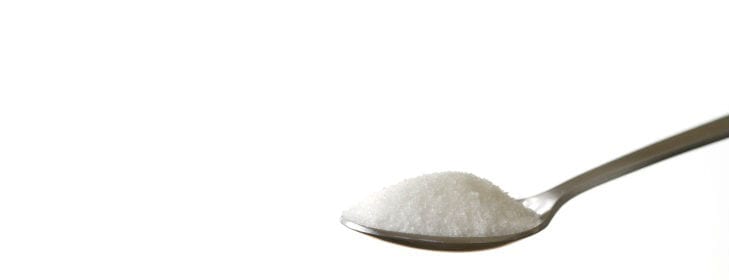
Embora este artigo seja sobre a creatina no geral, a partir daqui vamos nos concentrar na forma monohidrato, já que é a forma mais estudada e provavelmente a melhor escolha.
How to take creatine
Charge phase?
Muitas vezes utiliza-se a chamada fase de carga na suplementação com creatina.
O que é esta fase de carga?
Esta fase de carga consiste em utilizar durante os 5 primeiros dias uma dose alta deste suplemento, para “encher” mais rapidamente as reservas no músculo, e assim começar a obter resultados de forma mais rápida.
A fase de carga não é obrigatória, apenas leva a que comeces a notar efeitos de forma mais rápida.
Para fazeres a fase de carga, deves utilizar durante os primeiros 5 dias de suplementação uma dose de 20g, separada em 4 tomas. Ou seja, vais tomar 4 vezes 5g de creatina ao longo do dia, durante 5 dias.
Depois disso, passas para a fase de manutenção.
What dose should I take?
After the 5 days of the loading phase, in which you use 20 grams per day, the dose increases to 3-6g, once a day.
If you do not intend to do a loading phase, start with this dose.
O número mais comum costuma ser 5gHowever, if you are very thin, 3g to 4g is enough to get good results, while if you are heavier, you can use 6g.
It is important to highlight that supplementation is done every day, that is, do not take it only on training days.
When should I take creatine?
Creatina depois do treino é o melhor momento para a usares, de preferência com um batido de whey protein and simple carbohydrates such as dextrose or maltodextrin.
Esta é a altura que vais conseguir os melhores resultados, devido à acção da insulina. (ref)
Um bom pós-treino seria um batido com proteína whey, maltodextrina/dextrose e creatina.
Em dia sem treino, podes tomar em qualquer refeição, de preferência com hidratos de carbono e proteínas.

How long do I take it?
There are several protocols for using this supplement, however, não existe nenhum protocolo ideal, e nenhuma duração perfeita.
O mais comum é vermos ciclos de 4 a 8 semanas, no entanto, não é obrigatória a paragem da suplementação com creatina após 8 semanas.
É possível continuar por mais tempo, desde que respeitando as doses recomendadas.
Ou seja, se estiveres a gostar dos resultados, podes continuar a suplementação durante mais de 8 semanas.
Creatina efeitos secundários?
A creatina é considerada um suplemento seguro em pessoas saudáveis, e segundo This one study, mesmo após 21 meses a tomar esta substância de forma continua, não surgiu nenhum problema.
Os efeitos secundários que podem surgir normalmente ocorrem quando a dose é demasiado elevada ou o consumo de água é muito baixo.
Estes efeitos secundários passam normalmente por náuseas e diarreia.
Ah, mas disseram-me que faz mal aos rins, é verdade?
Não, segundo This one estudo, após 12 semanas de suplementação, não existiu nenhum problema a nível de rins.
E ao fígado, vai-me dar cabo do fígado?
Também não, segundo This one estudo, não existiu nenhum problema nem com os rins, nem com o fígado a longo prazo.
Important: This applies to pessoas saudáveis, pessoas com problemas já existentes devem consultar o seu médico antes de experimentar este suplemento.
Água, retenção de líquidos
A creatina é uma substância osmoticamente activa, e quando é armazenada dentro dos músculos, ela “arrasta” água consigo.
This means two things:
- É importante um consumo de água elevado quando se faz este tipo de suplementação, para se conseguir melhores resultados.
- É daqui que nasce o efeito de volumização da creatina, arrastando mais água para dentro das células do que seria normal, e assim o músculo aumenta.
É normal que ganhes 1-2kg no inicio devido à retenção de água dentro do músculo. (ref)
Consome pelo menos 2 litros de água por dia.
What to expect from creatine?
Se nunca utilizaste este suplemento, provavelmente estás curioso em relação ao que ele pode fazer por ti na prática.
What to expect:
- Aumento de força
Vai fazer com que levantes mais peso e faças mais repetições. - Aumento de peso a curto e médio prazo
Prepara-te para ganhar 1 a 2kg no inicio da suplementação, é normal, não é músculo, é agua.
Após isso, graças aos aumentos de força, irás também ganhar peso em massa muscular, se acompanhares com uma boa dieta.
Important: A creatina não é nenhum esteróide anabolizante, portanto, não esperes resultados semelhantes.
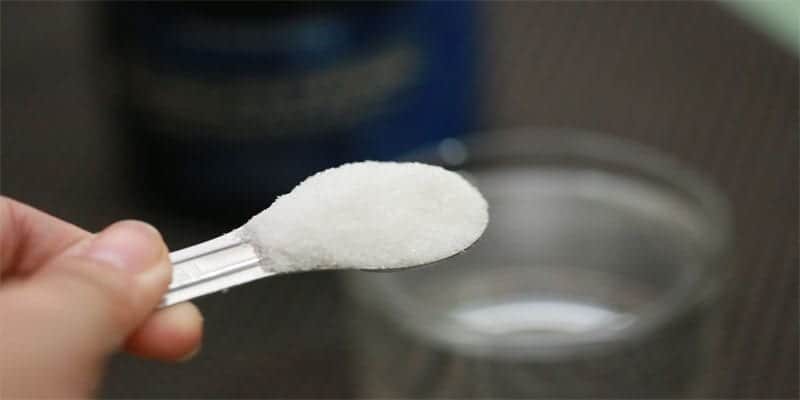
And when to stop taking it?
Primeiro que tudo, quando deixas de tomar continuas com as reservas elevadas durante 30 dias ou mais, ou seja, durante esse período continuas a beneficiar desta suplementação.(ref)
O que vai acontecer eventualmente quando as reservas voltarem ao normal é:
- Vais provavelmente perder 1 ou 2kg, isto é o peso que ganhaste no inicio, não é músculo, é agua. Lembra-te que este suplemento aumenta a quantidade de água dentro do músculo.
- Vais provavelmente perder alguma força, mas nada de substancial.
Ao voltares com os níveis de creatina ao normal, vais acabar por perder o grande beneficio deste suplemento no ciclo de ADP-ATP.
No entanto, é provável que a força que tenhas no final do ciclo deste suplemento, seja superior à que tinhas no inicio.
And finally, os ganhos de massa muscular que fazes durante a suplementação não vão desaparecer quando terminares.
Perdes apenas algum volume muscular devido ao aumento de água no músculo provocado por este suplemento.
Creatine before training?
Não existe nenhum problema em tomares este suplemento antes do treino, simplesmente não esperes uma acção imediata, porque não funciona dessa maneira.
Ao contrário da cafeína, que tem um efeito imediato e tiras partido desse efeito no treino do dia, creatine works cumulatively.
É como se estivesses a encher uma piscina com água.
Vais enchendo lentamente, e quando está cheia, aí sim, podes mergulhar e nadar, ou seja, tirar o proveito da piscina.
No deste suplemento, enches as tuas reservas de creatina e fosfocreatina lentamente, e quando estiverem cheias, tiras todos os benefícios.
Não esperes encher as tuas reservas em um dia ou dois.
Quanto tempo até notar efeitos?
Os benefícios começam a aparecer ao fim de 1 a 2 semanas.
É importante destacar também que existem pessoas que não reagem à suplementação de creatina.
Conclusion
A Creatina é provavelmente the most effective supplement on the market for those looking to increase muscle mass.
Para além de ser o mais eficaz, é também barato e combina bem com outros suplementos, como a whey for example.
Se o teu objetivo é o aumento de massa muscular, a suplementação com Creatina é sem dúvida uma boa aposta.
Qual a melhor creatina? Vê o artigo The best Creatine supplements (and the worst too).
Se tiveres alguma dúvida, utiliza a zona de comentários em baixo.

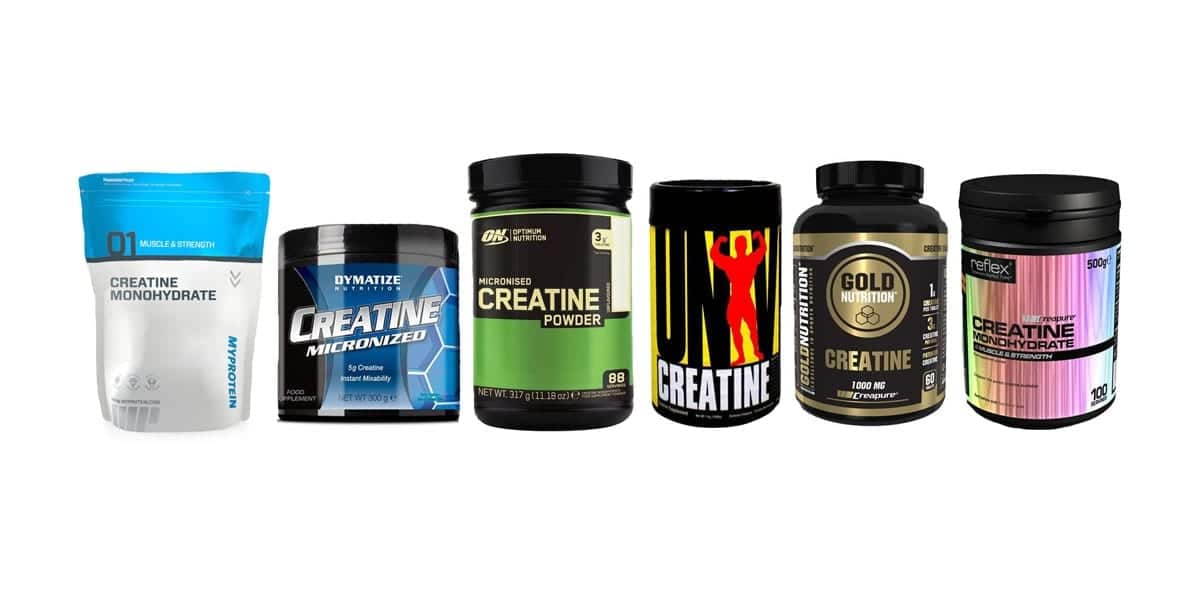
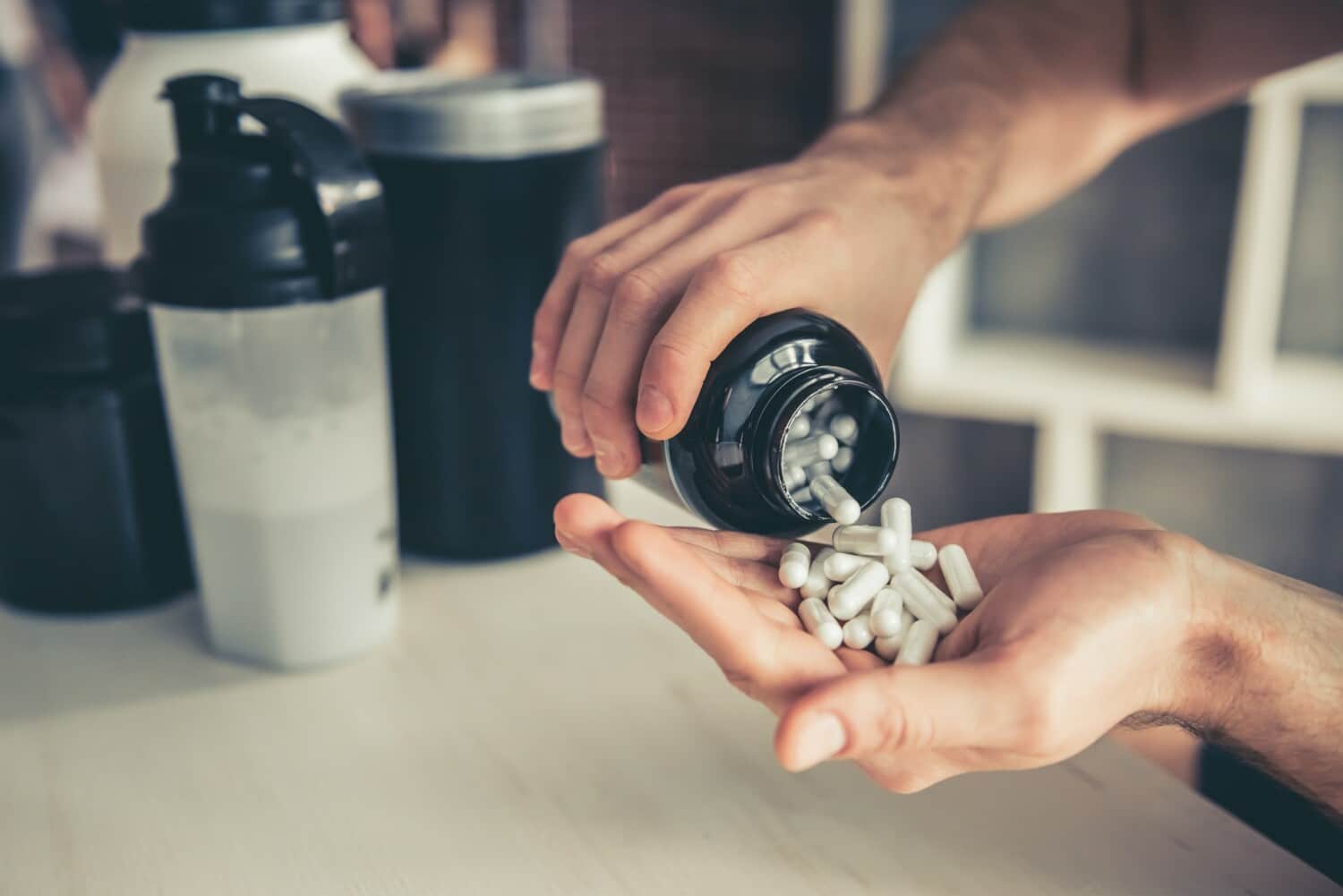
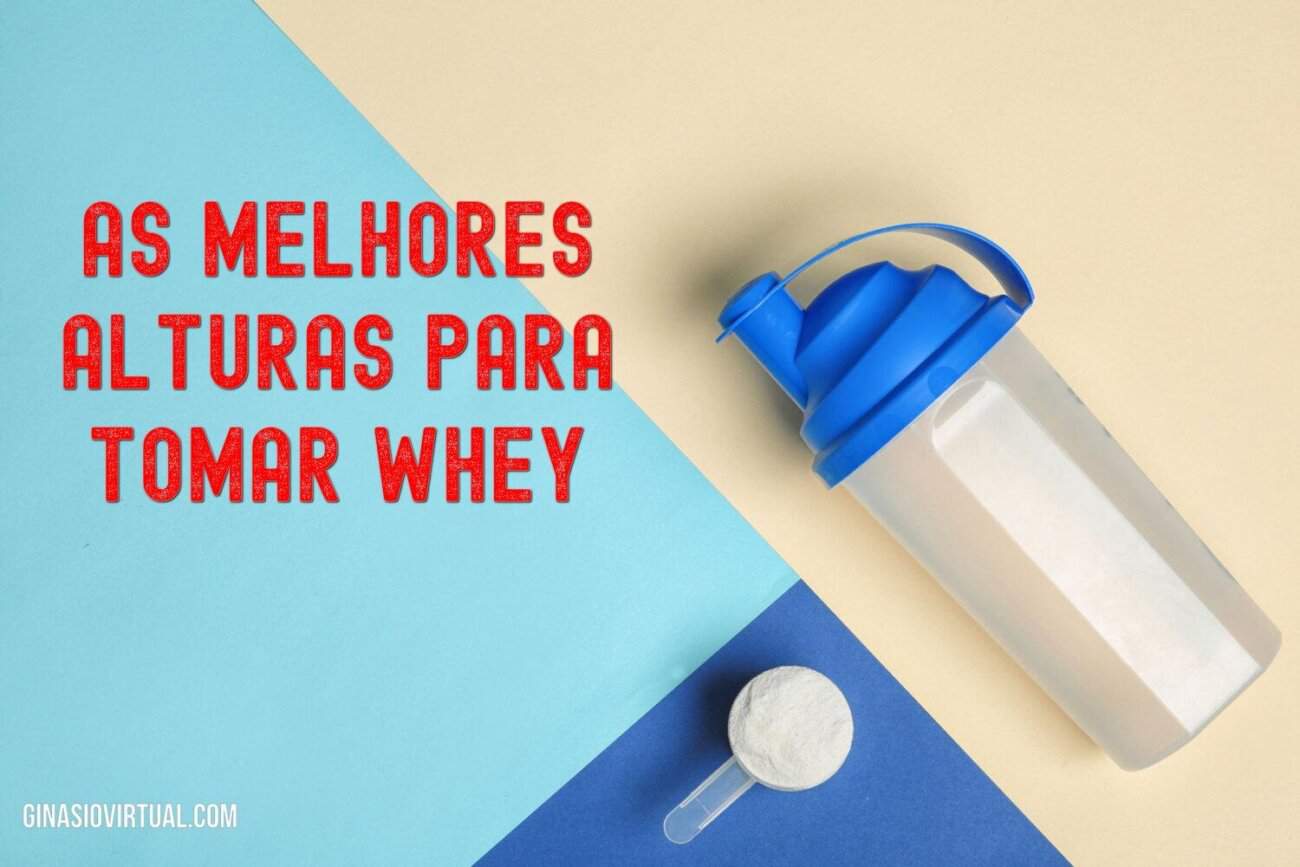
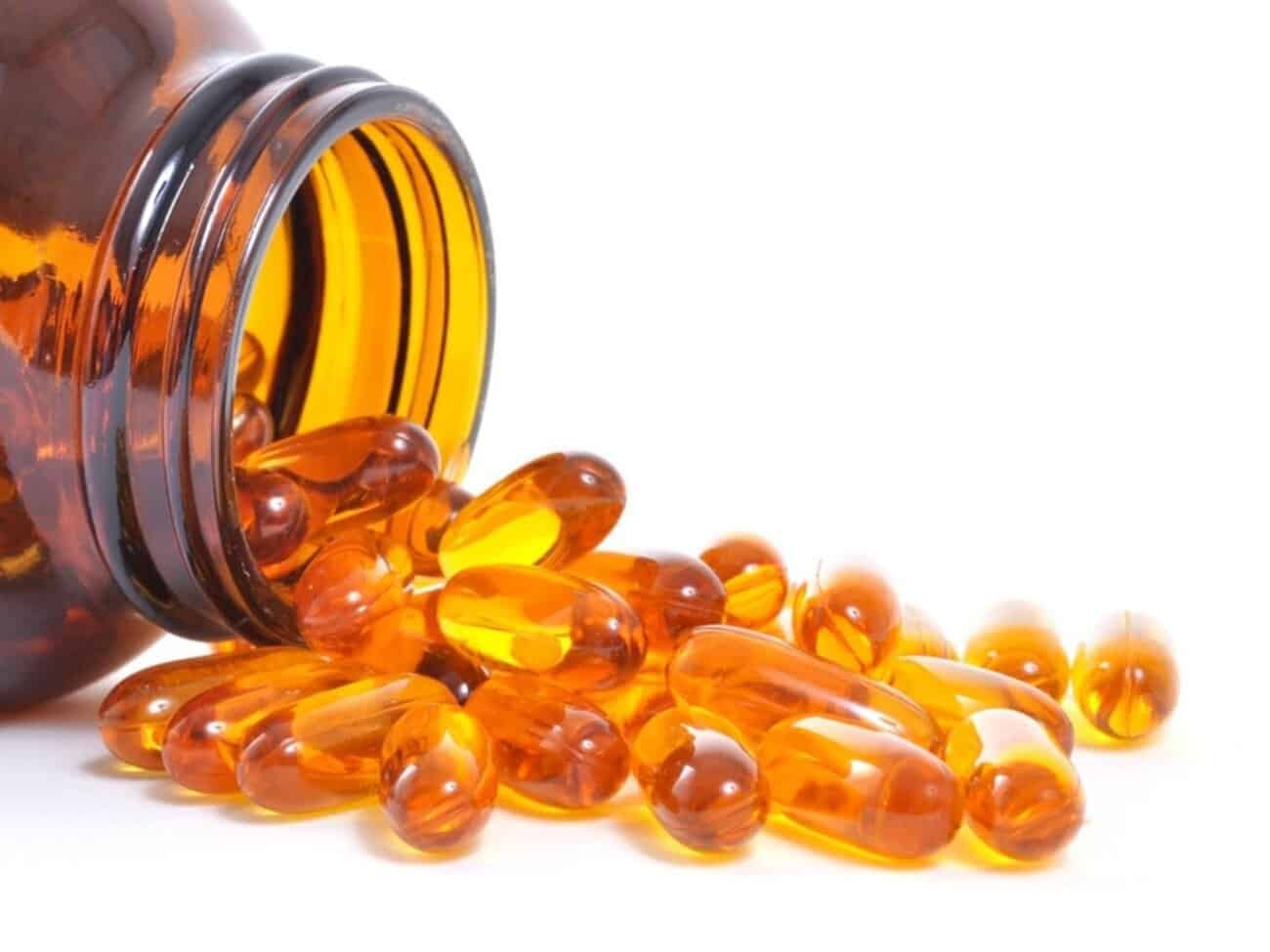
Very good, I really liked this guide!
Thanks!
Desde já gostava de pedir tambem um guia sobre glutamina e a vossa opinião!
É provável que saia também um guia para a glutamina ;)
Antes de mais muito boa a informacao! Chegou hoje a minha creatina da myprotein, quanto pesa o scup que trás!?
Olá Vitor, qual é a creatina?
Creatine Monohydrate
Em princípio, segundo o site, é de 3g, mas podes sempre confirmar com eles :)
Olá, tenho uma dúvida que provavelmente é comum mas eu só agora comprei suplementos.
Pratico artes marciais 3 vezes por semana e diariamente treino pesos e flexões.
But just now I started again.
I was stopped for some time.
A dúvida é acerca de suplementos.
É saudável, viável ou útil tomar L-cartinina e Creatinina simultaneamente?
Thanks.
A Creatina pode-te ajudar com os treinos, a L-Carnitina provavelmente não vai ter grande benefício.
goodnight. I started at the gym 2 months ago and I would like to buy creatine but I'm undecided between the different brands that exist. any suggestions please? Thanks in advance
Tens aqui uma boa opção: https://goo.gl/85aEMA
e essa proteína com creatina ? acham uma boa solução?
Muscletech Nitro-Tech®: Isolado de Whey + Aumentador de Massa Muscular Magra.
https://www.prozis.com/pt/pt/muscletech/nitro-tech-performance-series-4lb-1814g?text=nitro
Hi Pedro.
Not really.
Esse suplemento só conta com 68% de proteína, já para não falar do preço elevado.
Olá. Parabéns ao vosso site. Muito esclarecedor. Quero começar a treinar e quero começar a tomar um suplemento de proteína whey ( 100% whey prime) e segundo alguns posts que eu li aqui no vosso site este suplemento não está entre as melhores mas eu não estou muito exigente quanto á grande quantidade de proteína e nem de bcaa’s ( os valores destes nesse tipo de sulpemento não é das piores) e também quero tomar a creatina ( vou tomar a creatina da Gold Nurition capsulas) e a minha preocupação é que eu quero tomar apenas um pacote de 100% whey prime (1,3kilo) e um frasco de creatina ( 60 caps) e parar de tomar e continuar o meu treino sem suplementação. E tenho medo de se eu parar de usar se os efeitos irão desaparecer e causar flacidez, estrias principalmente no bumbum e nas pernas, etc. Me esclareçam isso por favor.
Olá,
Gostaria de te perguntar se a creatina, visto que faz retenção de água nos músculos (ainda que sub-cutânea), seria contra-natura numa fase de cutting/dieta hipocalórica.
Um abraço
Pode ajudar a manter a força, mas por outro lado o efeito de retenção de água pode não ser muito agradável nessa fase.
Hmmm mas essa retenção não fica toda no próprio músculo?
A retenção da Creatina varia muito de pessoa para pessoa.
Há quem note muito esse efeito ao ponto de perder um pouco de definição, enquanto que outros não. É uma questão de experimentares :)
Estou há umas semanas a tomar monohidrato creapure da My Protein e não notei perda de definição, bem pelo contrário :)